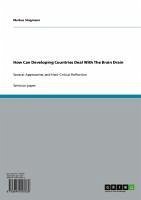2.9 per cent of the world population have been migrants in the year 2000. In numbers this means, that 175 million people have redistributed. As the World Migration Report points out "(...) the most significant changes in recent years have been an increased concentration of migrants in the developed world and in a small number of countries." (International Organization of Migration, 2005, p. 379). Of special interest for the developed countries is the immigration of high skilled professionals, for example scientists and engineers. Countries like Germany are facing two problems. The fertility rate is low and therefore the population is shrinking. Moreover the demand to skilled professionals cannot be responded from the native population. At the same time well educated people from developing countries are leaving their homes to work as specialists in high-tech industries like biotechnology, nanotechnology or information technology (IT). In developing countries the emigration rate of skilled people in the year 2000 was much higher (7.3%), than the whole emigration rate (1.5%). Although the rate of skilled workers has decreased from 7.7% since 1990, some countries still face a huge loss of brains (Docquier; Marfouk, 2007, p. 198).
Dieser Download kann aus rechtlichen Gründen nur mit Rechnungsadresse in A, B, BG, CY, CZ, D, DK, EW, E, FIN, F, GR, HR, H, IRL, I, LT, L, LR, M, NL, PL, P, R, S, SLO, SK ausgeliefert werden.









